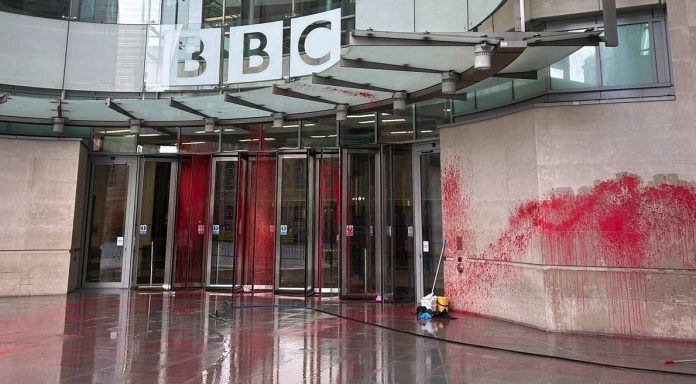A damning new report by the Centre for Media Monitoring (CfMM) has accused the BBC of institutional bias in its coverage of Israel’s war on Gaza, alleging that the broadcaster consistently marginalized Palestinian suffering while amplifying Israeli narratives.
Titled “BBC on Gaza-Israel: One Story, Double Standards,” the 180-page report examined 3,873 articles and 32,092 TV and radio segments between October 7, 2023, and October 6, 2024. The analysis concluded that the BBC’s editorial decisions violated its mandate of impartiality and distorted the truth of the conflict.
Among the key findings is a stark disparity in how deaths were reported. Despite Palestinian fatalities outnumbering Israeli ones by 34 to 1 (42,010 vs. 1,246), Israeli deaths were referenced up to 33 times more per fatality in articles and 19 times more in broadcasts.
Emotive terms like “massacre,” “atrocities,” and “butchered” were used overwhelmingly for Israeli victims. The term “massacre” appeared 18 times more for Israeli casualties and was never used in headlines to describe Palestinian deaths.
The BBC was also found to have disproportionately platformed Israeli voices—interviewing 2,350 Israelis compared to 1,085 Palestinians. Moreover, while 38 guests were asked to condemn Hamas’s October 7 attack, none were similarly pressed to denounce Israel’s military actions, which resulted in tens of thousands of civilian casualties.
“Under its Royal Charter, the BBC is obligated to provide balanced reporting,” said Faiza Mujahid, head of research at CfMM. “This report shows that obligation was not met during one of the most pivotal years in the conflict’s history.”
The report also criticizes the BBC for largely erasing historical context. Only 0.5% of articles referenced Israel’s occupation, blockade, or actions prior to October 7. There was minimal coverage of Israel’s controversial military policies and inflammatory rhetoric, with only 3% of articles referencing possible Israeli war crimes—despite international investigations being underway.
Even when interviewees brought up genocide accusations, they were often interrupted or dismissed. The BBC’s language choices also reflected double standards—regularly using “hostages” for Israelis held by Hamas, while avoiding similar language for over 10,000 Palestinians imprisoned under administrative detention without charges.
A further comparison with BBC’s Ukraine-Russia war coverage revealed a higher degree of humanization for Ukrainian victims and more frequent accusations of war crimes against Russia—2.7 times more than against Israel.
The CfMM report includes statements from human rights experts, former BBC journalists, and public figures such as UN Special Rapporteur Francesca Albanese and Amnesty International UK’s Sacha Deshmukh, who called the findings a “comprehensive indictment” of BBC’s editorial conduct.
The BBC has yet to respond to the report. CfMM is urging the broadcaster to conduct an independent review and implement reforms to restore public trust and editorial balance.
“This isn’t about blaming individual reporters,” Mujahid emphasized. “It’s about a systemic failure to present the full truth in one of the gravest humanitarian crises of our time.”




